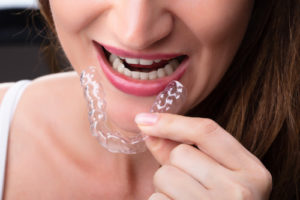If you clench or grind her teeth regularly, then you are not alone. Teeth grinding is a very common problem and is usually referred to as bruxism. At Lovett Dental Jersey Village, we have worked hard to expand the services that we provide to ensure that we can take care of all of your oral health needs. In addition to recommending regular cleanings, we can also handle acute concerns, such as those related to sleep bruxism. In some cases, we can treat these issues with nightguards at one of our local offices. You can learn more about our services by calling 281-890-5002.
What Is Sleep Bruxism?
While teeth grinding can happen at any time, it is much more common at night. Usually, this is referred to as sleep bruxism. Bruxism can apply up to 250 lb of force to the surfaces of the teeth.
Therefore, it should come as no surprise that sleep bruxism can lead to problems. Some of the symptoms of sleep bruxism include:
- Individuals often wake up in the morning with headaches because their jaw, scalp, and face are sore.
- Individuals who grind their teeth at night often wake up tired because bruxism disrupts their sleep quality.
- Teeth grinding can also destroy the surfaces of the teeth, eroding enamel and leading to tooth decay.
- Over time, sleep bruxism can also impact someone’s ability to eat, speak, and swallow.
It is critical to see a trained oral health professional as quickly as possible for all of these reasons.
How Do Night Guards for Bruxism Help?
One of the ways that a dentist might treat bruxism is to prescribe nightguards. Nightguards can be helpful because they cushion the surfaces of the teeth. The job of a nightguard is to reduce the tension that is placed on the enamel. Placing a cushion in between the surfaces of the teeth will prevent someone from grinding down the enamel.
Furthermore, this will also redistribute the forces being applied to the teeth. Redistributing this force from grinding can go a long way towards saving the jawbone and surrounding muscles. As a result, individuals will also sleep better at night, improving their overall quality of life.
Night Guards for TMJ Can Help as Well
Also, another complication that might arise due to sleep bruxism is called TMJ. TMJ refers to the temporomandibular joint. If someone is suffering from TMJ issues, that might experience popping, clicking, or intermittent locking up the jaw.
By placing a nightguard between the teeth’ surfaces, the forces applied to the joint will be redistributed. Therefore, instead of someone feeling aches and pains in the jaw, face, and scalp, they will be able to relax.
At the same time, there are lots of options available when it comes to nightguards. For all of these reasons, it is important to work with a trained oral health professional who has experience dealing with bruxism and TMJ. That is where we can help you. Rely on the team at Lovett Dental Jersey Village to help you with all of your oral health needs.
Contact Lovett Dental Jersey Village Today for Help with Nightguards and Sleep Bruxism
You deserve comprehensive oral healthcare. That is where we can help you. At Lovett Dental Jersey Village, we provide everything from preventative dental care to emergency services. We would be happy to help you as well. Our team will take the time to listen to you and your concerns. Then, we will tailor our treatment plants to meet your needs. Contact us today at 281-890-5002 to speak with a member of our team. We look forward to meeting you and your family.
